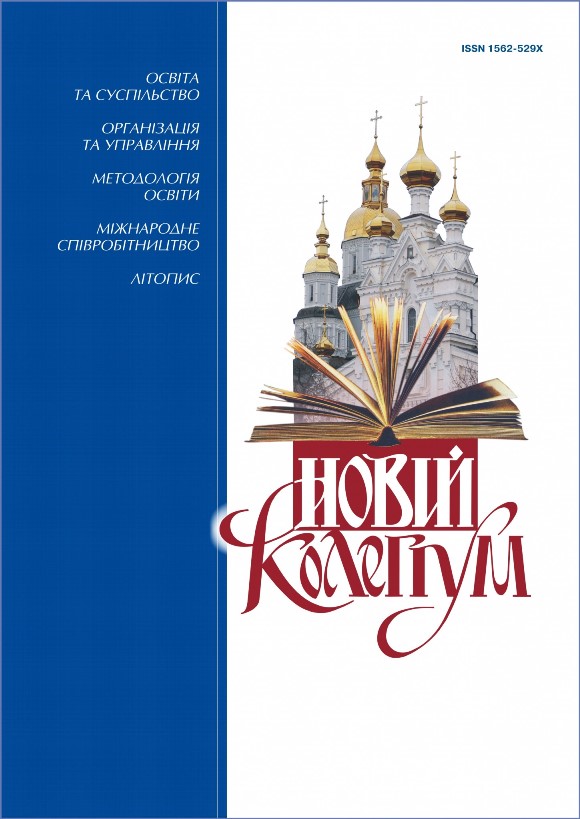Pedagogical system and moral and ethical teachings of Hryhoriy Skovoroda through the prism of three centuries
DOI:
https://doi.org/10.30837/nc.2022.4.30Keywords:
education, teacher, philosopher, pedagogical system of Hryhoriy Skovoroda, moral and ethical teaching of Hryhoriy Skovoroda, personality educationAbstract
The article is devoted to the study of the unique pedagogical and moral and ethical views of the Ukrainian philosopher and teacher Hryhoriy Skovoroda. The source of these views was the traditions of folk pedagogy, folk wisdom, folk views on education and upbringing. His pedagogical views are based on ethical problems relevant to Europe in the 18th century and on Socratic dialogues. They reflected the main features of progressive pedagogy: humanism, patriotism, high morality, nationalism, "conformity with nature". Skovoroda developed one of the leading problems of philosophical and anthropological discourse – the problem of self-actualization and self-realization of the individual, based on the concepts of Socrates, Plato, Democritus, Aristotle, Cicero, and Augustine Aurelius. He reflected his pedagogical views in parables, poems, fables and the epistolary genre. Skovoroda believed that the teacher should develop children's natural talents, be able to feel their desire for "related" work, ridiculed the blind copying of Western traditions and manners, distant and alien to the nature of Ukrainian children. These principles of humanism and "kinship" were aimed at achieving a noble goal – the upbringing and education of students, taking into account their capabilities and inclinations. Education and upbringing of a person who has work in accordance with natural gifts, inclinations and abilities permeates the pedagogical system of Hryhoriy Skovoroda.
Skovoroda's poetry and prose, philosophical works have a highly ethical and moral direction and are based on the worldview of the Ukrainian people. The thinker considered the doctrine of man and his happiness to be the most important, it became the content of H. Skovoroda's philosophical and life searches. He considers happiness as a state of independence and peace of mind, which is achieved by freeing oneself from the pressure of the surrounding world and overcoming boundless passions, evil will within a person. Skovoroda emphasized the importance for a teacher to have a high moral and spiritual culture. Only a teacher with a high moral and spiritual qualities is able to ensure the correct upbringing of the young generation.
References
Багалій Д. І. Український мандрований філософ Г. С. Сковорода. Харків : Держ. вид., 1926. 397 с.
Бердяев Н.А. О назначении человека. Москва, 1993. 393 с.
Захара І.С. Проблема людини в українській філософії XVI – XVIII ст. / І.С. Захара, М.В. Кашуба, О.В. Матковська. Львів : Логос, 1998. 239 с.
Ковалинський М. І. Жизнь Григорія Сковороди // Г. Сковорода. Повне зібрання творів: у 2-х т. Т.2. Київ : Наук. думка, 1973. С. 439–476.
Ковальчук Е.І. Актуальність морально-етичних орієнтирів творчої спадщини Г.С. Сковороди // зб. матеріалів конф. «Спадщина Г. С. Сковороди: минуле та сучасне» (до 295-річчя від дня нар. Г.С. Сковороди), 5–7 грудня 2017. Харків : ХНУРЕ, 2017. С. 24-25.
Северин Н.В. Рецепція України у європейській культурі: компаративний аспект : монографія. Харків : НТУ «ХПІ», 2019. 220 с.
Сковорода Г. Вірші. Пісні. Байки. Діалоги. Трактати. Притчі. Прозові переклади. Листи. Київ : Наук. думка, 1983. 543 с.
Сковорода Г. Листи до Михайла Ковалинського / упорядкування, передмова, примітки й коментарі проф. Л. Ушкалова. Харків, 2012. 184 с.
Сковорода Григорій Пізнай в собі людину. Львів : Світ, 1995. 528 с.
Сковорода Г. Повне зібрання творів у двох томах. Київ, 1973. Т. 2. 576 с.
Українська морально-етична спадщина і гуманістичні цінності [Електронний ресурс] – Режим доступу: http://works.doklad.ru/view/Cit00WAyf1U.html
Усатенко Г. О. Про Григорія Сковороду, ідентичність і давню літературу // Дивослово. Сковородиніана ХХІ ст.: міждисципл. студії. 2013. № 5. С. 47–50.
Цицерон М.Т. Избранные сочинения. Москва, 1975.

